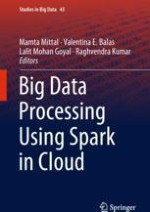2019 | OriginalPaper | Buchkapitel
Personalized Diabetes Analysis Using Correlation-Based Incremental Clustering Algorithm
verfasst von : Preeti Mulay, Kaustubh Shinde
Erschienen in: Big Data Processing Using Spark in Cloud
Verlag: Springer Singapore
Aktivieren Sie unsere intelligente Suche, um passende Fachinhalte oder Patente zu finden.
Wählen Sie Textabschnitte aus um mit Künstlicher Intelligenz passenden Patente zu finden. powered by
Markieren Sie Textabschnitte, um KI-gestützt weitere passende Inhalte zu finden. powered by
